The Saint of the Day
 |
 |
 |
 |
 |
 |
 |
St. Anselm of Canterbury - April 21
Biographical selection:
St. Anselm of Canterbury (1033-c.1109), Bishop, Confessor and Doctor of the Church, was intrepid in his combat for the Faith and the defense of the Church against King William II, or William Rufus.
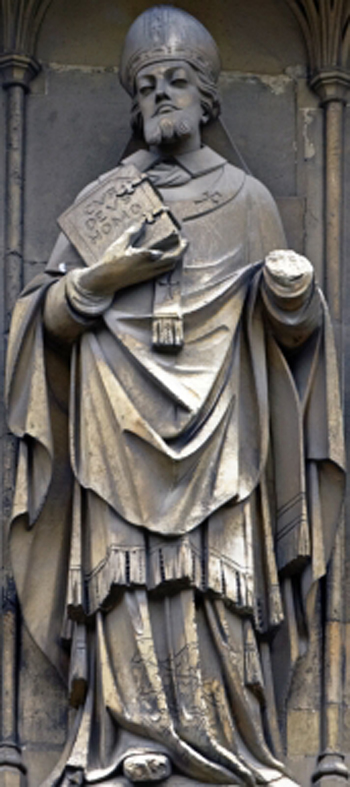 "Christ," he affirmed, "does not want a slave as His Spouse. He loves the liberty of His Church in this world more than anything else."
"Christ," he affirmed, "does not want a slave as His Spouse. He loves the liberty of His Church in this world more than anything else."
The English Bishops decided to consecrate Anselm as Archbishop of Canterbury, but he categorically refused the office because he knew the problems that would arise from William II's stubborn encroachment into affairs of the Church.
The Prelates pointed out to him the consequences for England of his refusal. He replied that he was aware of those problems; however, as an old man with 60 years of age, he was barely able to bear his own weight, so how could he bear the load of an entire church? Further, the venerable Abbot of Bec argued, it was outside his orbit to mingle in temporal affairs.
The Bishops responded that they would leave to him only the paths of God and that they would take care of the temporal affairs. Anselm raised a new argument that he could not abandon the many obligations he presently had.
When Anselm continued to resist accepting the office, Bishops took him to the Sovereign, who was gravely ill.
The King spoke these words: "Anselm, what are you doing? Why are you sending me to Hell? Remember the friendship of my parents and do not allow me to perish. For I know I will be condemned if I do not set this Archbishopric in order."
Those who were present insisted that Anselm accept, warning him that his refusal would result in the death of the King.
The Saint turned toward the two monks who had accompanied him and asked them, "My brothers, why do you not come to my succor?"
One of them responded: "Who are we to resist if this is the will of God?"
"You surrender too quickly!" Anselm replied.
Seeing his obstinacy, those present then accused him of cowardice. A Crosier was placed in the hands of the King, and Anselm was pushed forward to approach the sickbed. The King presented the Crosier to Anselm, but he clenched his fist. The Bishops forced his hands open and placed the Crosier in it. Then, as Anselm held the Crosier in his hand, they shouted, "Long live the Bishop!" and sang the Te Deum.
Forthwith they brought him to a closed church and consecrated him Archbishop of Canterbury.
Comments of Prof. Plinio:
This is strange and magnificent at the same time.
To understand the ensemble of these events, one must take into consideration that Canterbury was the oldest Diocese of England and, therefore, the first see of that country. In that time, more than today, the Archbishop and Primate had an influence over all the Bishops of their country. In that period communication with Rome was very slow and difficult and there was no body of organized nuncios. So, it was necessary for the Bishops of a country to choose one among themselves who would be the cornerstone of all. In England this cornerstone was the Archbishop of Canterbury.
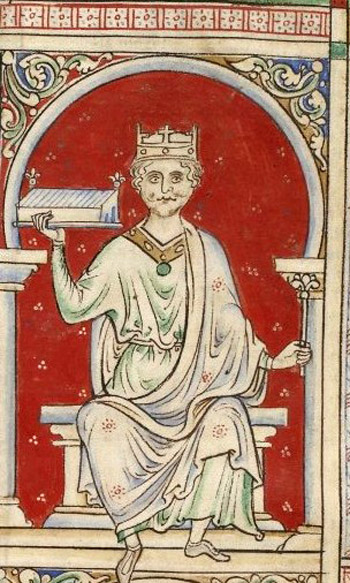 This Archbishop had a great importance for at that time the germs of the Revolution were already multiplying and spreading in the form of a desire for temporal power. The Kings had a tendency to constrict the liberty of the Church, usurp her privilege to name their brother Prelates and appropriate for themselves her material goods, which she used to succor the poor and maintain the splendor of the divine worship.
This Archbishop had a great importance for at that time the germs of the Revolution were already multiplying and spreading in the form of a desire for temporal power. The Kings had a tendency to constrict the liberty of the Church, usurp her privilege to name their brother Prelates and appropriate for themselves her material goods, which she used to succor the poor and maintain the splendor of the divine worship.
On the other hand, the Bishops were often also temporal lords, who exerted a good influence over the political panorama of the kingdom. Some Kings, moved by bad spirit, wanted to usurp for themselves other fiefs to annul the influence of the ecclesiastic fiefs.
These factors led the Monarchs to try to assume the power to name the Bishops for important Dioceses so that they would follow their political aims.
It is a childish to think that this kind of political agenda does not continue today. This is not the place to give details, but one blatant fact that calls my attention is that I do not see Prelates resisting the President of a Republic when the latter should be reprimanded for his conduct. So then, some kind of pact between the two clearly exists.
St. Anselm was a man – already old – who had made great services to the Church. The English Bishops ardently desired him to become the Archbishop of Canterbury because he was a natural leader to defend them against the King.
The King also desired him for this high office because, despite his past difficulties with the Church, he had fallen seriously ill and was afraid to die and go to Hell for not providing a good candidate for the important See of Canterbury. We know that the fear of Hell has led many persons to the gates of Heaven; few things can better close the doors of Hell than the fear of it.
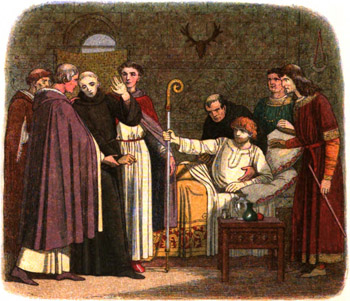 Then, we have that very curious scene: The Bishops ask him to assume this office but he refuses, arguing that he was already old and tired. He probably realized that, should the King recover, the Monarch and his court would create more problems for the Church and St. Anselm would be obliged to take strong positions against him. He feared that his weakness would not bear that fight. Naturally, he would expect that a younger man would be more fitting for that battle.
Then, we have that very curious scene: The Bishops ask him to assume this office but he refuses, arguing that he was already old and tired. He probably realized that, should the King recover, the Monarch and his court would create more problems for the Church and St. Anselm would be obliged to take strong positions against him. He feared that his weakness would not bear that fight. Naturally, he would expect that a younger man would be more fitting for that battle.
Then comes the scene where he is forced to accept the office, an episode that perhaps had an amicable tone and took place amidst smiles – the selection is mute on this particular. The scene is so strange that we cannot dismiss as absurd the hypothesis that things happened in this amiable way. In an atmosphere of affability, the moment came when he, moved by the strong insistence of the other Bishops, resolved to accept the See of Canterbury. However, he would not have been physically coerced to do so, but morally persuaded that he should no longer resist such a general and unanimous desire.
St. Anselm would not have accepted the consecration if he were not convinced that this was the will of God. As described in the selection above, he would have accepted this consecration as a sort of martyrdom.
Since he was a Saint and is in Heaven, we should be persuaded that in fact he chose to accept the mission of being Archbishop of Canterbury.
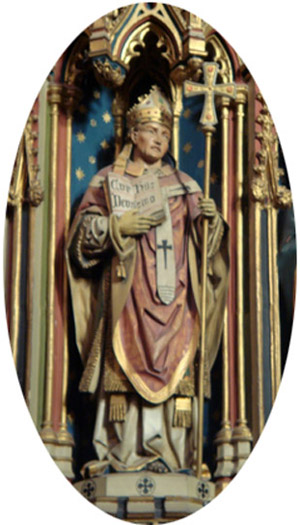 At times, divine grace in its immense liberty uses very strange means to achieve an end, never immoral or illegitimate means, but at times surprising and disconcerting means. Perhaps in this case the insistence of the Bishops was a grace to show the detachment of St. Anselm and the liberty he wanted to maintain in his fight against the King.
At times, divine grace in its immense liberty uses very strange means to achieve an end, never immoral or illegitimate means, but at times surprising and disconcerting means. Perhaps in this case the insistence of the Bishops was a grace to show the detachment of St. Anselm and the liberty he wanted to maintain in his fight against the King.
The insistence of the Bishops brings to mind these words of the Gospel, "The kingdom of Heaven suffers violence." (Mat 11:12) It is necessary to make violence to enter Heaven.
Sometimes it is necessary to make a holy violence to acquire what we need. Our Lord gives us that parable of the owner of a house who is already in bed when an irritating man knocks at his door asking for bread. He responds that he has no bread for him and that he is already in bed and does not want to get up. But the man is so insistent and inopportune that the landlord finally rises, opens his doors and gives him what he was requesting. He tells the poor man that he does this to put an end to his inopportune requests. (Cf. Lk 11: 5-13)
Our Lord gives us this example to show us how to pray… That is, when we do not have great merit, we should be very insistent in our requests; that insistence will win for us from God, who, as if irritated by our inopportune action, will finally give us what we ask.
Here, in the case described above of St. Anselm, something similar appears to have taken place from the part of the Bishops.
This strange description in which St. Anselm is presented as forced to accept a nomination he did not want, is hard to understand. But is shows that we are facing one the superior ways of God, not entirely explicable, which form one of the beauties of the History of the Church.
If everything were explicable in the Church, her History would be missing one of its truly divine notes. The more divine a thing is, the more apt it is to be imbued with mystery. It is the presence of mystery that marks the divine superiority and imposes the respect of men. To show that God is Divine and impenetrable, He often does not act clearly. It is, therefore, a way of acting filled with wisdom.
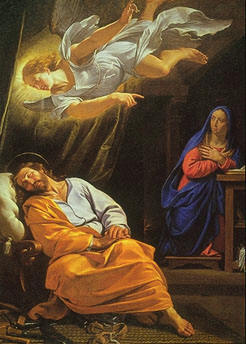 For example, today we see the Catholic Church as if she were dying. In this is the greatest mystery in the whole 20 centuries of the life of the Church. In face of it, we should believe in the divinity of the Holy Catholic Church more than ever! I would not say despite the mystery, but because of the mystery.
For example, today we see the Catholic Church as if she were dying. In this is the greatest mystery in the whole 20 centuries of the life of the Church. In face of it, we should believe in the divinity of the Holy Catholic Church more than ever! I would not say despite the mystery, but because of the mystery.
Only a Church that is divine can have such fortitude and grandeur that she can be mysteriously invaded by darkness and not die. It is necessary to be divine to pass through this apparent death and then appear on the other side glorious and resplendent as if she were resurrected!
From this small mysterious episode in the life of St. Anselm we must fly to the much higher region of the great mysteries of the Catholic Church. Let us make to Our Lady an act of love for the tremendous mystery we must face and bear today, certain that great mysteries have great solutions.
Never has man had to face a more terrible mystery than St. Joseph but, afterwards, what an explanation! It was the explanation of all explanations!


The Saint of the Day features highlights from the lives of saints based on comments made by the late Prof. Plinio Corrêa de Oliveira. Following the example of St. John Bosco who used to make similar talks for the boys of his College, each evening it was Prof. Plinio’s custom to make a short commentary on the lives of the next day’s saint in a meeting for youth in order to encourage them in the practice of virtue and love for the Catholic Church. TIA thought that its readers could profit from these valuable commentaries.
The texts of both the biographical data and the comments come from personal notes taken by Atila S. Guimarães from 1964 to 1995. Given the fact that the source is a personal notebook, it is possible that at times the biographic notes transcribed here will not rigorously follow the original text read by Prof. Plinio. The commentaries have also been adapted and translated for TIA’s site.
St. Anselm of Canterbury (1033-c.1109), Bishop, Confessor and Doctor of the Church, was intrepid in his combat for the Faith and the defense of the Church against King William II, or William Rufus.

St. Anselm, the great Benedictine Abbot of Bec who reluctantly became Archbishop of Canterbury
The English Bishops decided to consecrate Anselm as Archbishop of Canterbury, but he categorically refused the office because he knew the problems that would arise from William II's stubborn encroachment into affairs of the Church.
The Prelates pointed out to him the consequences for England of his refusal. He replied that he was aware of those problems; however, as an old man with 60 years of age, he was barely able to bear his own weight, so how could he bear the load of an entire church? Further, the venerable Abbot of Bec argued, it was outside his orbit to mingle in temporal affairs.
The Bishops responded that they would leave to him only the paths of God and that they would take care of the temporal affairs. Anselm raised a new argument that he could not abandon the many obligations he presently had.
When Anselm continued to resist accepting the office, Bishops took him to the Sovereign, who was gravely ill.
The King spoke these words: "Anselm, what are you doing? Why are you sending me to Hell? Remember the friendship of my parents and do not allow me to perish. For I know I will be condemned if I do not set this Archbishopric in order."
Those who were present insisted that Anselm accept, warning him that his refusal would result in the death of the King.
The Saint turned toward the two monks who had accompanied him and asked them, "My brothers, why do you not come to my succor?"
One of them responded: "Who are we to resist if this is the will of God?"
"You surrender too quickly!" Anselm replied.
Seeing his obstinacy, those present then accused him of cowardice. A Crosier was placed in the hands of the King, and Anselm was pushed forward to approach the sickbed. The King presented the Crosier to Anselm, but he clenched his fist. The Bishops forced his hands open and placed the Crosier in it. Then, as Anselm held the Crosier in his hand, they shouted, "Long live the Bishop!" and sang the Te Deum.
Forthwith they brought him to a closed church and consecrated him Archbishop of Canterbury.
Comments of Prof. Plinio:
This is strange and magnificent at the same time.
To understand the ensemble of these events, one must take into consideration that Canterbury was the oldest Diocese of England and, therefore, the first see of that country. In that time, more than today, the Archbishop and Primate had an influence over all the Bishops of their country. In that period communication with Rome was very slow and difficult and there was no body of organized nuncios. So, it was necessary for the Bishops of a country to choose one among themselves who would be the cornerstone of all. In England this cornerstone was the Archbishop of Canterbury.

King William Rufus, who feared Hell if he did not better protect the Church he had tried to dominate
On the other hand, the Bishops were often also temporal lords, who exerted a good influence over the political panorama of the kingdom. Some Kings, moved by bad spirit, wanted to usurp for themselves other fiefs to annul the influence of the ecclesiastic fiefs.
These factors led the Monarchs to try to assume the power to name the Bishops for important Dioceses so that they would follow their political aims.
It is a childish to think that this kind of political agenda does not continue today. This is not the place to give details, but one blatant fact that calls my attention is that I do not see Prelates resisting the President of a Republic when the latter should be reprimanded for his conduct. So then, some kind of pact between the two clearly exists.
St. Anselm was a man – already old – who had made great services to the Church. The English Bishops ardently desired him to become the Archbishop of Canterbury because he was a natural leader to defend them against the King.
The King also desired him for this high office because, despite his past difficulties with the Church, he had fallen seriously ill and was afraid to die and go to Hell for not providing a good candidate for the important See of Canterbury. We know that the fear of Hell has led many persons to the gates of Heaven; few things can better close the doors of Hell than the fear of it.

St. Anselm refuses to take the crosier from the King
Then comes the scene where he is forced to accept the office, an episode that perhaps had an amicable tone and took place amidst smiles – the selection is mute on this particular. The scene is so strange that we cannot dismiss as absurd the hypothesis that things happened in this amiable way. In an atmosphere of affability, the moment came when he, moved by the strong insistence of the other Bishops, resolved to accept the See of Canterbury. However, he would not have been physically coerced to do so, but morally persuaded that he should no longer resist such a general and unanimous desire.
St. Anselm would not have accepted the consecration if he were not convinced that this was the will of God. As described in the selection above, he would have accepted this consecration as a sort of martyrdom.
Since he was a Saint and is in Heaven, we should be persuaded that in fact he chose to accept the mission of being Archbishop of Canterbury.

St. Anselm was later forced into exile by King William II over the investiture question
The insistence of the Bishops brings to mind these words of the Gospel, "The kingdom of Heaven suffers violence." (Mat 11:12) It is necessary to make violence to enter Heaven.
Sometimes it is necessary to make a holy violence to acquire what we need. Our Lord gives us that parable of the owner of a house who is already in bed when an irritating man knocks at his door asking for bread. He responds that he has no bread for him and that he is already in bed and does not want to get up. But the man is so insistent and inopportune that the landlord finally rises, opens his doors and gives him what he was requesting. He tells the poor man that he does this to put an end to his inopportune requests. (Cf. Lk 11: 5-13)
Our Lord gives us this example to show us how to pray… That is, when we do not have great merit, we should be very insistent in our requests; that insistence will win for us from God, who, as if irritated by our inopportune action, will finally give us what we ask.
Here, in the case described above of St. Anselm, something similar appears to have taken place from the part of the Bishops.
This strange description in which St. Anselm is presented as forced to accept a nomination he did not want, is hard to understand. But is shows that we are facing one the superior ways of God, not entirely explicable, which form one of the beauties of the History of the Church.
If everything were explicable in the Church, her History would be missing one of its truly divine notes. The more divine a thing is, the more apt it is to be imbued with mystery. It is the presence of mystery that marks the divine superiority and imposes the respect of men. To show that God is Divine and impenetrable, He often does not act clearly. It is, therefore, a way of acting filled with wisdom.

A great mystery resolved by a visit of an Angel who tells St. Joseph not to abandon the Virgin Mary
Only a Church that is divine can have such fortitude and grandeur that she can be mysteriously invaded by darkness and not die. It is necessary to be divine to pass through this apparent death and then appear on the other side glorious and resplendent as if she were resurrected!
From this small mysterious episode in the life of St. Anselm we must fly to the much higher region of the great mysteries of the Catholic Church. Let us make to Our Lady an act of love for the tremendous mystery we must face and bear today, certain that great mysteries have great solutions.
Never has man had to face a more terrible mystery than St. Joseph but, afterwards, what an explanation! It was the explanation of all explanations!

 | |
|
|
The texts of both the biographical data and the comments come from personal notes taken by Atila S. Guimarães from 1964 to 1995. Given the fact that the source is a personal notebook, it is possible that at times the biographic notes transcribed here will not rigorously follow the original text read by Prof. Plinio. The commentaries have also been adapted and translated for TIA’s site.


